What does South Asian Heritage Month mean to you?
The College welcomes and supports South Asian Heritage Month, which runs from 18 July to 17 August each year and seeks to commemorate and celebrate South Asian cultures, histories and communities.
People with South Asian heritage have had a significant and positive impact within healthcare, the NHS and our College.
We value the rich diversity of our membership and would like to celebrate and champion the achievements and perspectives of our members with South Asian heritage.
“Having the opportunity to honour a culture which is the essence of who I am enables me to give more to my professional work.”
Dr Ramai Santhirapala, RCoA Council Member, Consultant Anaesthetist at Guy’s and St Thomas’ NHS Foundation Trust.
If you would like to share your story, we would love to hear from you. Please contact ssoper@rcoa.ac.uk
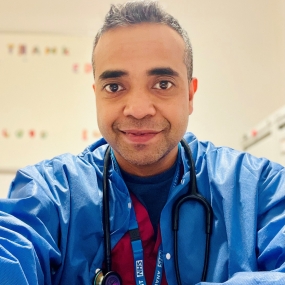
I came to the UK in December 22, as a clinical fellow in cardiothoracic anaesthetics. It’s been over a year now, but I am still very new to the system, learning, understanding and blending in at the same. It’s an entirely new environment for me and I have realised that in spite of many differences in cultural beliefs, the NHS is a place of inclusion where everyone is working with the sole purpose to achieve best outcomes for the patients. I feel privileged being part of such a system with vibrant culture and work ethics.
I am from the northeastern part of India, quite secluded from the main capital but a place of immense natural beauty and cultural diversity. My medical school was one of the very few set up by the British in India. It was called “John Berry White Medical School, established by Dr John Berry White, a philanthropist and a Brigadier in the British Army. Many of the departments still have the beautiful British architectural designs and have been well preserved.
My foundation in medicine started there, but my career progressed through many stages and experiences. Choosing anaesthesia as a career was, I would say a gift from one of my teachers as he showed me how important a role we play both in and out of theatres and in the emergency room. It fascinated me, how a change in colour of the cannula would make so much difference in saving a patient’s life. This field of medicine has always been close to my heart and from the day I started my training, I have enjoyed every moment of learning and gaining more experience. I owe my knowledge and who I am today to my family and my mentors who have supported me all throughout.
My career took an abrupt change when after post-graduation, I joined the armed forces. It was a choice in search for a stable job to support my family but was no less a challenge. I changed for the better again as I had to prove that I can work as a soldier as well. It was altogether a different experience in terms of patient profile and logistical needs. It taught me how to adapt and improvise, be physically fit and lead by example. I was awarded a commendation for managing battle casualties and completed my due service after being promoted to the rank of Major.
Anaesthesiology as a subject, demands a lot of discipline and dedication and I guess my experience with the armed forces helps me keep up with that.
I have special interest in cardiothoracic anaesthetics, having worked some time both during and after my post-graduation, and was fortunate enough get an opportunity to continue doing the same here in the UK. Looking forward, I still think there is a lot to learn, scope to improve and giving back what we learn.
We bring along with us a different culture and way of life. We mould and accept new things but deep within we are all still humans looking for the best way to express ourselves, I think being “free to be me” is an aptly chosen theme to celebrate South Asian Heritage Month.
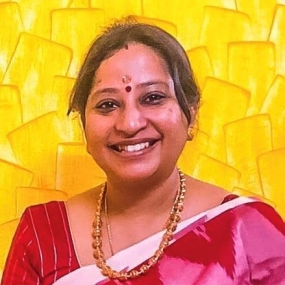
As we celebrate the South Asian Heritage Month 2024, it is immensely gratifying to be able to share my journey with others. My anaesthesia journey started in 2007 as a trainee. Before moving to UK in 2022, I was working as a Consultant Liver Transplant Anaesthetist in India for 7 years. Presently, I am working at Imperial College Healthcare NHS Trust as a Senior Clinical Fellow as part of London Integrated Programme in Anaesthesia.
I grew up in the Andaman and Nicobar islands, India. These islands are often termed as mini India because of their immense diversity- both cultural and ecological. People from all parts of India live there as part of their jobs. My cultural identity is an amalgamation of all cultures I came in contact with during my 18 years of stay there. I strongly believe in ‘unity in diversity’ and India is a glowing example. As an anaesthetist, I have worked all across India and thus been able to imbibe the best of practices from world renowned institutions.
‘Free to be me’ is a theme which is very appropriate in this context. I have served as a member of the DEI committee of the International Liver Transplant Society for two years and I strongly believe that individual autonomy is very crucial in growth, both personal and professional. When I moved to UK, I had to unlearn quite a few things before I could learn anew. However, this was never a hindrance because of my cosmopolitan upbringing. Today, I am proud to say that I have settled in quite well and my dream is to contribute towards developing the science of anaesthesia on a global platform so that when I am gone, I am able to leave behind some indelible footprints for the posterity.
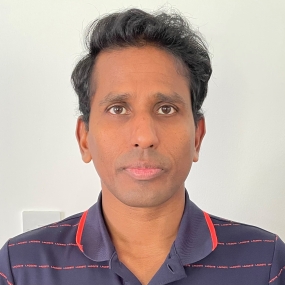
I am Dr Muthuraja Marimuthu, a Consultant Anaesthetist working in Aneurin Bevan Health Board in Newport, Wales.
My South Asian heritage is a profound and integral part of my identity, deeply rooted in the rich tapestry of traditions, values, and history from the region. Growing up, I was immersed in a culture that celebrates diversity, resilience, and community. From vibrant festivals like Diwali and Eid, which bring together families and friends in joyous celebration, to the daily rituals that emphasise respect for elders and a strong sense of familial duty, my cultural heritage has shaped my worldview.
The languages, music, cuisine, and customs of South Asia have instilled in me a deep appreciation for multiculturalism and the importance of preserving and honouring one's roots. My cultural identity is a blend of these traditional elements and the contemporary influences of living in a diverse, global society. This fusion allows me to navigate and appreciate different cultures while maintaining a strong connection to my South Asian origins.
The theme ‘free to be me’ resonates deeply with my experiences and aspirations. As an anaesthetist, I strive to bring my authentic self into my professional life. This journey has not been without its challenges, as the medical field often demands conformity to established norms. However, my South Asian heritage provides a unique perspective and strength that I leverage in my career. I feel a profound sense of pride in my cultural identity, which allows me to offer compassionate, culturally sensitive care to a diverse patient population.
While there are moments when societal expectations and stereotypes can be limiting, I actively work towards breaking these barriers by being a visible example of diversity and inclusion in the medical profession. The freedom to be myself, both culturally and professionally, is an ongoing journey, and I am committed to creating spaces where others feel equally empowered to embrace their full identities.
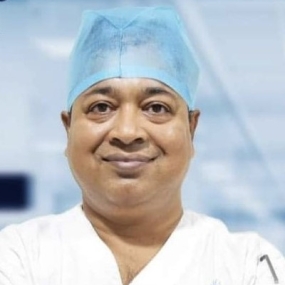
The moment I witnessed a doctor who could swiftly calm patients with general anaesthesia or other pain-relieving injections, I was inspired. An ICU visit in a post graduate hospital strongly influenced my decision to become an Anesthesiologist. They wielded intricate instruments, managed complex calculations, monitored vital signs —all while caring for patients with dwindling hope.
Coming from Bangladesh, where rural life shaped my upbringing, I once never imagined artificial ventilation could save snakebite or GBS patients. This realization during my medical school days propelled my interest in anaesthesia. Another motivating factor was the social perspective: I believed specialised training in anaesthesia would enable me to handle critical situations better than a general practitioner performing routine surgeries. Given the severe shortage of anaesthetic specialists, I seized opportunities to manage substantial caseloads under the guidance of consultants and postgraduates, often working independently in rural and urban hospitals.
I was fortunate to train extensively under Royal College Fellows, both as a learner and collaborator, I pursued further specialisation at home and abroad after my fellowship. Currently, I am dedicated to advancing ultrasound-guided nerve block techniques across my country.
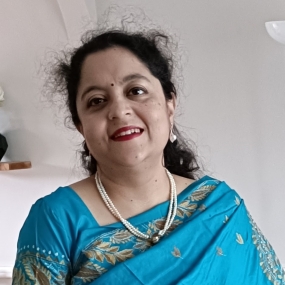
As we celebrate the South Asian Heritage Month 2024, I wished to speak a bit about my journey as an anaesthetist.
I started as an anaesthetist in 2006 in Delhi. This is when I fell in love with the subject and the myriad challenges it presents on a day-to-day basis. After I finished my training, I got a job as a junior consultant in a busy tertiary corporate hospital in Delhi. It was very exciting initially. Soon however I had a feeling of stagnancy and the need to do something different & challenging kept pestering me. I applied for the MTI fellowship and decided to take the leap into the unknown…
In September 2018 I arrived in this country with my husband and a 5-year-old in tow. I was a bit excited & very nervous. I was glad to find everyone so welcoming and I found it very easy to settle in. During the Covid pandemic, while recovering from a nasty infection my outlook towards life in general changed. I began to appreciate the simple moments of joy around me. One of my proudest moments was to collect the FRCA in front of my family.
I identify myself as a very proud Indian and am deeply attached to my roots and culture. I am involved with an NGO which organizes religious festivals and cultural events for the South Asian Community. I adore Indian food and music.
The theme this year is ‘Free to be Me’. I have grown as an anaesthetist in this country. I am presently working as a locum consultant & love my work and my wonderful colleagues. So yes, I can definitely say, ‘I am Free to be Me’.
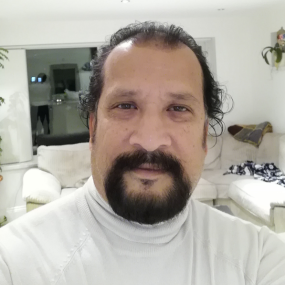
I am Dr Sudhakar Srirama, working as an anaesthetist for 32 years.
I was trained in India and came to UK in 1995. My identity is Human first then Indian. I feel proud that I have been nurtured in UK to understand the values of healthcare. I strongly associate myself with the RCoA. When I joined the NHS, I had a major cultural shock. Different country, different culture, different accents and I thought I didn’t know any English at all for the simple reason that we were taught English in a different way.
Patient interaction was very different too. My colleagues helped me a lot from the very beginning. Every place I worked I felt welcome. I was very shy and reluctant to interact with others because of cultural differences. I learnt to take tiny bits at a time like make effort to talk more with local colleagues and patients to understand the culture better.
I am proud that I am more at ease with the culture now and still maintain my identity. I had difficulty facing the exams because of my accent and the nervousness of seeing examiners as unhelpful and not encouraging. I started being more emphatic and confident in my work and during exams. I had the opportunity to be on the panel in CT recruitment and I could identify with the candidates of different cultures. My advice would be to take one thing at a time and make the effort to understand both the culture and exams and I am sure you will succeed.

I started my anaesthesia journey in the UK in the ‘80s and had the opportunity to work in Morriston, Singleton, and some affiliated hospitals In Swansea. Anaesthesia was my conscious career choice and I never regretted it. Anaesthesia training at that time was a “see one do one” scenario. I spent five memorable years in those hospitals and had some excellent trainers and role models. The majority from whom I learned the basics of anaesthesia were registrars from Syria, Iraq, Sri Lanka, and India. I passed my FRCA exam while I was working in Swansea.
I relocated to Pakistan when a new medical university with international credentials opened. To establish a new anaesthesia department was a big challenge. We the first hires in anaesthesia, were three faculty members and we started the department with three trainees and three operating rooms. Anaesthesia was not well recognised speciality in the country in those times. When introducing myself as an “anaesthesiologist” I was often asked “are you a doctor?”. We also faced several challenges as in any other low middle income country. There were shortages of resources, faculty, medication and equipment. New skill sets had to be learnt, new guidelines and processes had to be outlined, educational and quality programs set up, as well as personal academic growth. The list appeared endless at that time.
We are now the premier anaesthesiology department of the country and have graduated nearly 200 trainees from our programme, many of them leaders in their own institutions. I also chaired the university department for eight years from 2002-2010. I am still working at the university on a post retirement contract and contributing to education and research. When I reflect on my anaesthetic journey, I feel proud of my contributions to my speciality in the institution, country and the region. I also feel indebted to those who trained me in the basics of anaesthesia at the start of my career.
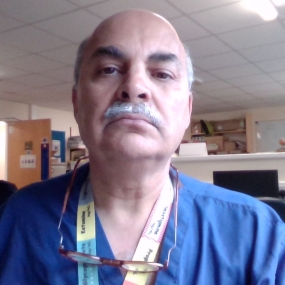
Getting to the UK has meant understanding the way of life here and the values that bind it together. They are quite different from my past experiences. There is a degree of compartmentalisation – one version of me that maintains its Indian identity (I have retained my Indian nationality) and another that is British. I would like to think that the former is intact, while I understand the British system well.
I can credit the NHS for its approach to integrating us - there is no overt pressure or disengagement due to my ethnicity, even from patients.
Read Dr Sinha's full profile in this blog.
